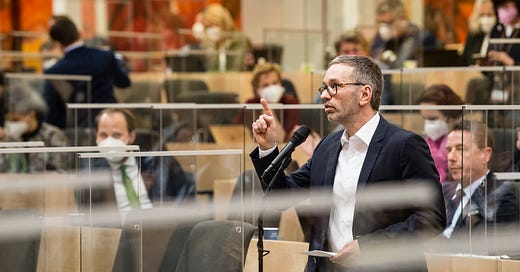Hofer or Kickl?
The Freedom Party is in a state of civil war between its presentable and fundamentalist far-right wings
Servus!
The Freedom Party (FPÖ) is in a state of civil war. Fighting broke out two weeks ago after Norbert Hofer, the party’s head and the third president of the Austrian parliament, spoke out in favor of members of parliament wearing masks while present in the debate chamber, an act of courtesy in which the FPÖ’s representatives still refuse to engage 14 months into a pandemic that has killed 9,682 Austrians.
This was viewed as friendly fire by the FPÖ’s parliamentary party, led by the indefatigable Herbert Kickl, which came out against Hofer. In an interview on a podcast hosted by the far-right magazine Info-Direkt, Johannes Hübner—a representative of the FPÖ in the Austrian parliament’s upper house—described the parliamentary party’s mood as one of “astonishment, horror, anger, and bewilderment.” Hübner also raised the prospect of a possible schism1.
Since Heinz-Christian Strache resigned as vice-chancellor in May 2019 over a cash-for-favors scandal before being booted out of the party later that year for fiddling his expenses, the FPÖ has had one nominal leader but two in effect. Hofer and Kickl represent an unhappy marriage of the party’s two wings, currents, and styles. If Hofer is the FPÖ’s head, Kickl is its heart. Hofer is the far-right’s professional, managerial face—someone who came close to winning the Austrian presidency in 2016. Kickl is a beer hall rabble rouser—an old ally of Strache who speaks the unvarnished language of the party’s base on immigration, Islam, and the coronavirus.
Adrift, the party is divided over whether it should, in its post-Strache phase, follow its head or its heart. Hofer would like the FPÖ to be, one might say, a replica of the conservative People’s Party (ÖVP), perhaps an inch or two more to the right but as presentable, professional, and fit for government. It is no secret that Hofer covets the vice-chancellorship and is open to being the ÖVP’s junior partner in government—as it was from 2017 to 2019 until Strache brought the whole thing crashing down.
Kickl, meanwhile, is committed to a hardline opposition course. Whether on the issue of masks, social distancing, or vaccines, Kickl and his allies are responsible for positioning the FPÖ as the party of Austria’s corona-sceptics and Querdenker2. If Hofer’s hope is to appeal to a broader swathe of the electorate by appearing more agreeable, Kickl’s is to double down on the FPÖ’s far-right populism in order to sure up its support among its core voters who, since the ÖVP took a more conservative, populist turn in 2017, have someone to turn to should the FPÖ be found wanting.
Strache himself, with half an eye on a possible return to the party, said last week Hofer isn’t fit to lead the FPÖ. “We’ll have to see if Kickl is prepared to take on the responsibility and dare to” lead the party, he told the friendly network oe24.TV. Strache is a man with no political future3, but his past indicates that the leadership question is one the FPÖ cannot ignore. From 1986 until 2019, the party had two dynamic, popular and populist leaders—first Jörg Haider, then Strache—whose cults of personality were part of the formula for the FPÖ’s two great successes: their marches into government in 1999/2000 and 2017.
Party veteran Andreas Mölzer—editor of the far-right rag Zur Zeit and a decent gauge of the FPÖ’s mood—was around for both. He said recently he considers a split unlikely but that the party’s current leadership structure, its ‘bipolarity,’ is unsustainable and that it will have to choose a single leader sooner rather than later. It is clear the FPÖ believes the current ÖVP-Green coalition cannot hold—a view not without merit—and that Austrians will go to the polls either in the fall of 2021 or the spring of 2022. Before then, the party must sort itself out and decide: head or heart, Hofer or Kickl.
Bis bald!
Thank you for subscribing to the Vienna Briefing. Do you know someone who would be interested in receiving this newsletter? Consider sharing it with them today.
More Pfizer On The Way
Pfizer/BioNTech have brought forward a shipment of their coronavirus vaccine to the EU. The bloc will receive the 50 million doses in Q2 as opposed to Q4 2021. For Austria, this means 500,000 people can be vaccinated more quickly than previously estimated, chancellor Sebastian Kurz said.
MAN Plant To Close
The truck and bus manufacturer MAN has begun laying off temporary and contract workers at their plant in Steyr. Having previously guaranteed it would remain operational until 2030, the future of the factory and its 2,300 employees now hang in the balance.
Austria Vienna Doomed?
Austria Vienna have been denied a license that would allow them to take part in the 2021/22 Bundesliga season. The Violets are currently seeking new investment or considering whether to go into administration in order to restructure their debt.
The party has form in this respect. In 2005, the FPÖ split when Jörg Haider formed the Alliance for the Future of Austria (BZÖ). In 2020, after his expulsion from the party, Heinz-Christian Strache formed Team HC Strache – Alliance for Austria.
Consider that Dagmar Belakowitsch, the party’s health spokesperson, was among those who took part the corona-sceptic movement’s ‘mother of all demonstrations’ on April 10. The protest in Vienna only attracted 3,000 participants.
Team Strache failed to cross the electoral threshold in last year’s municipal elections in Vienna, and Strache is due in court in the coming weeks, having been charged with corruption and misuse of government office.




